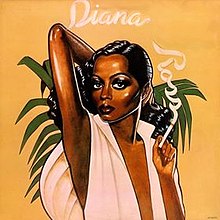Ross (1978 album)
| Ross | ||||
|---|---|---|---|---|
 |
||||
| Studio album by Diana Ross | ||||
| Released | September 3, 1978 | |||
| Recorded | 1971–1978 | |||
| Genre | R&B, soul | |||
| Length | 38:56 | |||
| Label | Motown | |||
| Producer | Hal Davis, Greg Wright, Ashford & Simpson, Michael Masser | |||
| Diana Ross chronology | ||||
|
||||
| Singles from Ross | ||||
|
||||
| Professional ratings | |
|---|---|
| Review scores | |
| Source | Rating |
| Allmusic | |
Ross is a 1978 studio album/compilation released by American singer Diana Ross on the Motown label. The album was a mixture of older tunes Ross recorded and newer recordings, side A consisting of four tracks recorded in 1978 and Side B of material recorded between the years 1971 and 1975, but remixed and/or extended by Motown in-house producer Russ Terrana specifically for the Ross album. Ross peaked at #49 on the US Pop Albums chart, and #32 on Black Albums. The album failed to chart in the UK. Its final USA sales figures stood at around 150,000 copies. The cover illustration was by Rickey Ricardo Gaskins. A different album also titled Ross was released on the RCA label in 1983.
Several outtakes from the 1978 Ross sessions produced by Hal Davis, Greg Wright and Michael Masser have subsequently been issued on various other albums with Ross. Titles among these include "You Build Me Up to Tear Me Down", "Sweet Summertime Livin'", "Share Some Love", "We're Always Saying Goodbye", "Fire Don't Burn" and "We Can Never Light That Old Flame Again".
Although only enjoying moderate chart success on its original release in 1978, in 2009 "Lovin', Livin' and Givin'" was one of thirteen tracks featured on Almighty Records' tribute/remix album We Love Diana Ross - The Remix Collection.
While alternate versions of most of the recordings contained on the Ross album have re-surfaced on a number of Motown/Universal Music compilations over the years, the original album in its original form was eventually re-released on compact disc (SHM CD) in Japan on November 28, 2012.
The version of "Lovin', Livin' and Givin'" in the movie Thank God It's Friday is almost an instrumental used as a background for dialogue.
The different versions of the song are as following:
The complete original album was finally released on CD in Japan; this is a list of alternate versions available on other CDs:
...
Wikipedia
